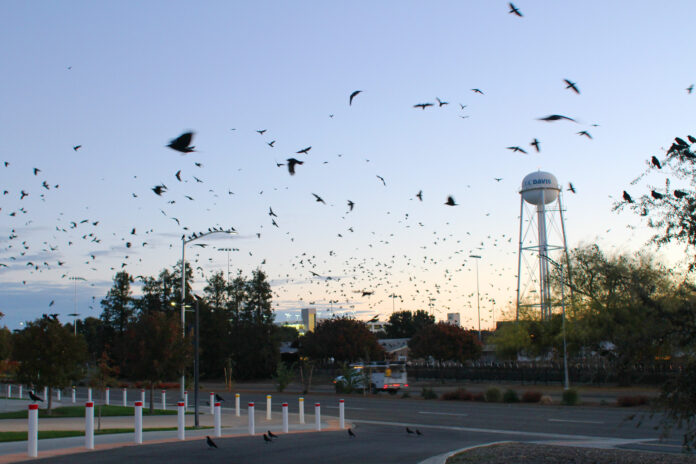UC Davis is no stranger to the crows that hover over campus. There seems to be a colony of them in particular areas around campus, especially the Silo.
Andrea Townsend, an assistant professor of urban conservation ecology in the Department of Wildlife, Fish and Conservation Biology, studies social behavior and disease transmission in birds, including the crows on campus.
According to Townsend, crows have a communal roost in the parking lot next to the Silo. They have what are known as staging areas — where a select portion of the crows from a larger group gather while they find their way to and from their bigger roost. The Silo could be serving as one of the staging areas for them.
“The reason that crows roost (and stage) together is unclear, but they often prefer well-lit city parking lots,” Townsend said in an email. “One hypothesis for why they roost communally is information sharing: they might learn from other birds at the roost about food sources and places to avoid. The campus has many attributes that crows prefer … the climate is relatively mild, [there are] brightly-lit urban parking lots and they can forage during the day in the agricultural fields surrounding Davis.”
Aside from the pure awe of noticing a huge flock of crows over you, one tends to begin to feel a faint sense of fear. There are so many of them that it is only a matter of moments before they poop on your bike, vehicle, or sadly enough, even you. On days like these, many Aggies begin to hope they don’t become the unfortunate victims of the crows flocking around.
For instance, Angelica Hernandez, a second-year clinical nutrition major, has seen so many of these glossy black birds circulating above her when walking by the Sciences Lecture Hall.
“I have seen many people running with newspapers or books over their heads so that they won’t get pooped on. I have also noticed many cars and many bikes with bird poop on them,” Hernandez said.
Priya Tuvell, a third-year animal science major and nutrition minor, has also witnessed an incredible number of crows roosting in the trees when biking to campus. She has seen the most during the fall and winter quarters.
“The trees they would roost in are right on top of the bike paths on either side of the street, and the smell of all their droppings was pretty horrible,” Tuvell said.
Having an interest in birds, Tuvell knows that crows are aware of the food readily available to them.
“Lots of sandwiches left on benches, spilt rice or pasta are a steady source of food. Such carbohydrate-laden foods are not healthy for the birds though, and people should be careful to dispose of their leftovers in the compost, recycling or trash, instead of leaving the food out for the birds,” Tuvell said in an email.
The incredible influx of crows around campus has some costs. Carey Avery, the associate director of the Campus Planning and Community Resources and a facilitator of the Grounds and Landscape Services, stated that cost of cleaning up after the crow droppings is something the department has been trying to track for the last year, and the cost varies month to month.
“Eight hours of labor per month are spent to power wash the sidewalks from [the] crow droppings,” Avery said in an email.
The crows who don’t seem to be going anywhere anytime soon, clearly have an impact on our community, costing the UC Davis campus both money and labor.




